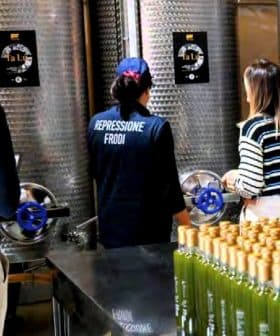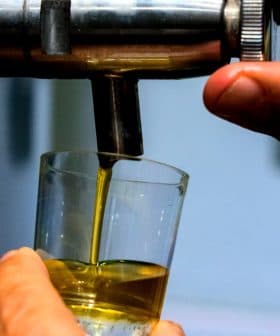Court Finds Olive Oil Grades Mean Little to 'Ordinary' Consumers
Kangadis Food Inc. admitted to selling olive pomace oil as “100% Pure Olive Oil” under its Capatriti brand, leading to a lawsuit by the NAOOA, who estimated that Kangadis sells about one million tins of the product each year. The Court’s ruling in the case ordered Kangadis to inform consumers about the mislabeling, but questioned the NAOOA’s likelihood of success in the ultimate case, highlighting the divide between industry insiders and ordinary consumers in the olive oil market.

Kangadis Food Inc., the olive oil company being sued by the North American Olive Oil Association (NAOOA) has admitted that, “at all relevant times prior” to the lawsuit, its Capatriti brand “100% Pure Olive Oil” was not pure olive oil. It was olive pomace oil instead. NAOOA estimated Kangadis sells about one million tins of the product each year.
Olive pomace oil is a refined product extracted from the byproducts of the first pressing, the leftover olive pits and pulp, using high heat and chemical solvents. “Olive pomace oil is not allowed in any grade of olive oil under any standard in the world,” said Eryn Balch, executive vice president of the NAOOA.
The case is ongoing. On April 25 an explanatory opinion, by the US Court of the Southern District of New York in NAOOA v. Kangadis Food Inc. explained the Court’s ruling of April 19, which did four things:
1. It declined from stopping Kangadis (doing business as “The Gourmet Factory” and selling its oil under the brand name of Capatriti) from selling “100% refined” as “100% pure” olive oil;
2. It ordered Kangadis to inform potential consumers that tins packed before March 1, 2013 contained pomace;
3. It refrained from ordering Kangadis to indicate on its website that it had mislabeled in the past; and
4. The ruling ordered NAOOA to post a $10,000 bond (common in requests for injunctions in order to compensate the defendant for losses in case the plaintiff fails to win the main case).
Kangadis claims, and the Court accepted, that no product packed after March 1, 2013, has contained pomace, but only “100% refined olive oil.”
The NAOOA ultimately wants compensation for its members for Kangadis’s alleged violations of: 1) the US 1947 Lanham Act, aka the Federal Trademark Act, which prohibits among other things false advertising; and 2) New York General Business Law sections 349 and 350 which protect consumers against deceptive acts and false advertising.
To obtain a preliminary injunction, NAOOA must show that it is likely to win the ultimate case and that they will suffer irreparable harm if the preliminary injunction is refused. To demonstrate such harm, it must show that its members are competitors and that there is a causal connection between the false advertising and its (members’) sales position. The Court accepts that such harm has occurred, but questions whether there is the necessary likelihood of success in the ultimate action.
This is where the decision is interesting and important. NAOOA does not seek to apply industry standards, which are voluntary and unenforceable in any case. Its position rides on the claim that the deceptive business practices will be “impermissibly misleading to consumers,” but the Court noted that it presents “no extrinsic evidence that the perceptions of ordinary consumers align with these various labeling standards.” The Court therefore finds that NAOOA has failed to show a likelihood of success on the merits in the ultimate case, as is required for the granting of a preliminary injunction.
“Olive oil industry insiders and certain regulators likely would understand Kangadis’s (Pure Olive Oil) label to describe a blend containing at least some virgin olive oil. But in the absence of any evidence to the contrary, it is far from clear that an ordinary consumer, unfamiliar with industry lingo, would perceive those terms the same way,” the Court wrote.
What the opinion reveals is something that gets little airing: the olive oil market is divided into the cognoscenti (who know the standards and pay the price for good olive oil) and the vast market of consumers for whom the basic decision to buy olive oil rather than other oils understandably reflects the limits of their curiosity and their budgets.
Consumer education plays a strong role in succeeding at the higher ends of the olive oil market. This court opinion should serve as a reminder that the high end does not represent the entire range of olive oil consumers. NAOOA may well ultimately win compensation for its members, but more informed “ordinary” consumers would increase the likelihood of success for plaintiffs seeking injunctive relief in the future.
A class action lawsuit was filed against The Gourmet Factory, the company that markets Capatriti olive oil, on April 19 for misleading and deceptive marketing.









